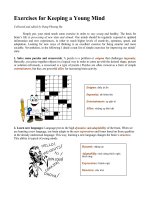Michael anthony mass casualties a young medic raq (v5 0)
Bạn đang xem bản rút gọn của tài liệu. Xem và tải ngay bản đầy đủ của tài liệu tại đây (1.28 MB, 163 trang )
MASS
CASUALTIES
A YOUNG MEDIC'S TRUE STORY
DEATH,
DECEPTION,
AND DISHONOR
IN IRAQ
OF
SPC MICHAEL ANTHONY
Copyright © 2009 by Michael Ruehrwein
All rights reserved.
This book, or parts thereof, may not be reproduced in any
form without permission from the publisher; exceptions are
made for brief excerpts used in published reviews.
“Reintegration” reprinted with permission from Samuel W. Tarr.
Published by
Adams Media, a division of F+W Media, Inc.
57 Littlefield Street, Avon, MA 02322. U.S.A.
www.adamsmedia.com
ISBN 10: 1-4405-0183-1
ISBN 13: 978-1-4405-0183-8 (paperback)
ISBN 13: 978-1-44050-438-9 (EPUB)
Printed in the United States of America.
JIHGF E D C B A
Library of Congress Cataloging-in-Publication Data
is available from the publisher.
This publication is designed to provide accurate and authoritative information with regard to the subject matter covered. It is
sold with the understanding that the publisher is not engaged in rendering legal, accounting, or other professional advice. If
legal advice or other expert assistance is required, the services of a competent professional person should be sought.
— From a Declaration of Principles jointly adopted by a Committee of the American Bar Association and a Committee of
Publishers and Associations
Many of the designations used by manufacturers and sellers to distinguish their product are claimed as trademarks. Where
those designations appear in this book and Adams Media was aware of a trademark claim, the designations have been
printed with initial capital letters.
This book is available at quantity discounts for bulk purchases.
For information, please call 1-800-289-0963.
“Mass Casualties finds the truth behind the most recent propaganda — the small stories,
the base commonality of human nature revealed in war. A purely personal and timely story,
moving from black comedy to a sun-baked depression, anchored with unsparing honesty.”
Samuel Sheridan
Author of A Fighter's Heart: One Man's Journey Through the World of Fighting
“Anthony's painful account of his time at war is at times difficult to read. This coming-of-age
war memoir details the very gut-wrenching journey he takes into manhood in the backdrop
of grueling combat. His voice is unique and deserves to be heard.”
David Bellavia
Co-Founder of Vets For Freedom; Medal of Honor and Distinguished Service
Cross Nominee; Author of House to House: An Epic Memoir of War
“Michael Anthony's candid narrative of his service in Iraq is far removed from the glamorized
picture of military life that has become a staple of our mass media. Instead, we are
confronted with a world of men and women psychologically strained to the breaking point.
You will share his sense of disillusionment after reading this eye-opening memoir.”
David Livingstone Smith, PhD
Author of The Most Dangerous Animal: Human Nature and the Origins of War
“Mass Casualties is a raw, vivid look at the realities behind the daily news about American
soldiers overseas. You will think differently about news from Iraq and Afghanistan after
reading this book.”
James Fallows
Author of Blind into Baghdad: America's War in Iraq
“Glossy recruitment brochures tell one story. This book tells another. Beyond the slick
fantasies promoted by the Pentagon and the euphemisms reported by the news media,
Mass Casualties offers readers an account of war that cuts against the mythical grain.”
Norman Solomon
Author of War Made Easy: How Presidents and Pundits Keep Spinning Us to
Death
“The human cost of war is excessive, as this harsh but thoroughly absorbing book by
Michael Anthony reveals. It's a riveting account of life within the pitch of battle, giving us —
his grateful readers — the feel of this war, its dreadful tensions, its horror, its absurdity.
Mass Casualties is an important book, and it deserves wide attention.”
Jay Parini
Author of Promised Land: Thirteen Books That Changed America
Author of Promised Land: Thirteen Books That Changed America
“There are plenty of books about war, usually featuring the trigger-pullers who directly
engage the enemy. Mass Casualties looks at war from a different angle, from those who
try to save the wounded and dying. Make no mistake: Their war is just as difficult. Michael
Anthony has captured the intensity of the OR, the crushing fatigue of shift duty, and the
inevitable clash of personalities that are part of any military unit. It's a great read for anyone
who wants to see the horror of war from a new perspective.”
Tom Neven
Marine Corps Veteran; Author of On the Frontline
“The full story of the Iraq War remains to be written, but the firsthand accounts of young
people who were there can help us begin to try and make sense of what is often taken as a
senseless conflict. Amidst the politics and economics of warfare there are individuals
struggling to survive, both physically and emotionally. The least we can do is listen to their
stories with genuine empathy and an open mind, as we seek pathways from war toward
peace.”
Randall Amster, JD, PhD
Executive Director of the Peace & Justice Studies Association
“A moving account of a young soldier's story. This deeply personal memoir gives voice to
the countless soldiers we have yet to hear from and never will.”
Yvonne Latty
Author of In Conflict: Iraq War Veterans Speak Out On Duty, Loss, and the Fight
to Stay Alive
“Mass Casualties is a raw and humorous account of Army medics dodging harm from
mortars and the military bureaucracy. Michael Anthony gives us a gripping memoir of a
young soldier trapped in a world of incompetence and hypocrisy that results from a total
failure of leadership. This insider's view of what really happens in an operating room full of
combat casualties and the effect it has on the caregivers is eye-opening. Our wounded
warriors and those who care for them deserve far better.”
Colonel Steven O'Hern
Author of The Intelligence Wars: Lessons from Baghdad
“Michael Anthony writes in the tradition of Joseph Heller and Richard Hooker, demystifying
the theater of war and revealing our soldiers to be all-too-human figures — comic and
petty, but sometimes heroic and tragic.”
Marc Folkoff
Author of Poems from Guantanamo: The Detainees Speak
“This isn't a portrait of the typical army experience in Iraq; this is one young man's
perspective on what happens when poor leadership fails the challenge of command.
Michael Anthony calls it like he saw it, refusing platitudes of the virtuous American soldier. If
only Vonnegut or Heller had material like this.”
Alex Vernon
Author of Arms and the Self: War, the Military, and Autobiographical Writing
“Michael Anthony's candid journal of his tour in Iraq offers a vivid sense of day-to-day life in
a war-zone medical unit. He enriches our understanding of the variety of ways —
sanctioned and unsanctioned, honorable and sordid — our occupying army deals with
boredom, fear, frustration, and loneliness.”
Christian G. Appy
Author of Patriots: The Vietnam War Remembered from All Sides
“SPC Anthony's authentic journal opens our eyes to the corrosive effect of the military
mindset on human sensibilities. This is the unadulterated grit of history, in the here-andnow.”
Ray Raphael
Historian; Author of Founders: The People Who Brought You a Nation
“Mass Casualties is a true-to-life exposé of the absurdity of the war in Iraq. Anthony lays
bare the hyper-reality of American knowinglessness about Iraq, and captures the day-today insanity of the war. Mass Casualties is a must-read for patriot Americans concerned
with the U.S. global empire and the undisclosed truths of the Iraq occupation.”
Peter Phillips
Professor of Sociology and Director of Project Censored, Sonoma State University
“SPC Michael Anthony channels Baghdad ER, Catch-22, M*A*S*H, and Lord of the Flies as
he narrates his dark, entertaining, and tragic journey through war. A thoughtful, candid, and
mesmerizing glimpse into the enigmatic world of a U.S. Army combat support hospital.”
David J. Danelo
Former Marines Captain; Purple Heart Recipient and Iraq War Veteran; Author of
Blood Stripes: The Grunt's View of the War in Iraq
“Michael Anthony's book Mass Casualties is unique and important. Readers of this
incredible book will never look at war or its aftermath in quite the same way again.”
Stanley Krippner, PhD
Coauthor of Haunted by Combat: Understanding PTSD in War Veterans
“From traumatic injuries to anthrax shots, Michael Anthony has captured in intricate detail
life in a combat-zone operating room. As someone who's done two tours myself, even I
learned an incredible amount.”
Brandon R. Friedman
Iraq Veteran; Author of The War I Always Wanted: The Illusion of Glory and the
Reality of War
“A scathing, satirical, and often shocking trip through “the other war” in Iraq — the war
within the U.S. Army, and within a soldier's soul. Michael Anthony's memoir is the perfect
antidote for anyone who would glorify war or its impact on warriors. He has penned his
generation's M*A*S*H, with echoes of Catch-22 and Hunter Thompson's Fear and Loathing
sagas.
Charles Jones
Journalist in the Iraq War; Author of Red, White or Yellow?: The Media and the
Military at War in Iraq
“Soldiers are witnesses to chaos and carnage, and there is a false belief that they should
recover from what they have seen and done, and have had done to them. A dark secret
about war is that it seldom builds character. Michael Anthony has written an honest book
that is both sobering and relevant.”
Donald Anderson
Editor of “War, Literature & the Arts,” an international journal of the humanities;
Author of When War Becomes Personal: Soldiers' Accounts from the Civil War to
Iraq
“Compelling. Frank. Funny. Disturbing. Michael Anthony loses his innocence in a slowmotion train wreck you can't help but watch. Mass Casualties opens up a brand new
conversation on the War in Iraq.”
Damon DiMarco
Author of Heart of War: Soldiers' Voices from the Front Lines of Iraq
“If you are afraid of the TRUTH don't read this book. SPC Michael Anthony's personal
experience of WAR has no censor. Reading his book is a journey into the battlefields of
death, sex, and the loss of his innocence.”
Lawrence Winters
Vietnam Veteran; Author of The Making and Un-making of a Marine
“Mass Casualties is a terrific story of war, emergency medicine, and the men and women
who suffer to treat wounded soldiers and civilians. On top of this, he tells the story
beautifully, managing to convey both the chaos and the boredom of life in a combat zone.”
John Merson
Vietnam Veteran; Author of War Lessons
“A raw and uncompromising account of one Army medic's experience in Iraq.”
Tim Pritchard
Journalist; Author of Ambush Alley: The Most Extraordinary Battle of the Iraq War
“A heart-wrenching tale of the war in Iraq imbued with a sense of outrage, but judicious in
its descriptions of those who tried to change things.”
Robert K. Brigham
Professor of History and International Relations; Author of Iraq, Vietnam, and the
Limits of American Power
To the men and women of my unit in Iraq:
It no longer matters how we got here,
only where we go from here.
The stories contained herein represent one man's journey in Iraq; they do not represent any
organization or person other than the author. Names, identities, and small facets of stories
have been changed to supply anonymity for the characters involved. Although everything
written is based on Michael Anthony's experiences while in Iraq — based on his own
recollection and journal entries — they do not represent word-for-word documentation;
instead they are retold as if the reader were in the room with the author as he explains the
stories.
Everything that follows has been verified by Anthony and several fellow soldiers who served
with him while in Iraq.
ACKNOWLEDGMENTS
I would like to thank all of the great people at Adams Media for their hard work and
dedication to my book. A big thanks to my editor Andrea Norville, Karen Cooper, Beth
Gissinger, Paula Munier, Wendy Simard, Frank Rivera, and Bob Shuman. Thanks to CR,
MR, and ET — for letting me get away with not cleaning the house while I wrote.
REINTEGRATION
Straighten up, it's alright
You can look me in the eyes
True, I am an American soldier
Serving this country, called home
This does not mean
I've humiliated prisoners
Burnt villages
Or killed any babies,
I am just like you.
There was a time
When I felt the same
That this uniform meant something
I reached for it
And all it offered
Only to be led into war
By mercenaries — hopeless and blind
Now that my tour is over
Let me slip back into the world
That I left behind.
We are now, simply neighbors
Occupying the same tenement
With the rats in the basement
And the leaking roof.
So please, save your parade
I've got no use for it now
I was just, doing my job
Samuel W. Tarr
PROLOGUE
“You are going to war! It is no longer a question of if you are going to go, but a question of
when. Look around! In a few years, or even a few months, several of you will be dead.
Some of you will be severely wounded or so badly mutilated that your own mother can't
stand the sight of you. And for the real unlucky ones, you will come home so emotionally
disfigured that you wish you had died over there.”
It's week seven of basic training and my drill sergeant is preparing us for war, and the
possibility that we might soon be dead. Eighteen years old and I am preparing myself to
die.
ACKNOWLEDGMENTS
REINTEGRATION
PROLOGUE
MONTH 1
MONTH 2
MONTH 3
MONTH 4
MONTH 5
MONTH 6
MONTH 7
MONTH 8
MONTH 9
MONTH 10
MONTH 11
MONTH 12
EPILOGUE
ABOUT THE AUTHOR
MONTH 1
“THIS IS THE TIME WHEN LOGIC AND REASON NEED TO OVERRIDE EMOTION.”
WEEK 1, DAY 1, MOSUL, IRAQ
0900 HOURS, AIRFIELD
Loaded with gear — a three-pound helmet, thirty-pound armored vest, eight-pound weapon,
and thirty-pound rucksack — we're running. There are four hundred of us from thirty-seven
different states across the United States. All of us have been brought together to run the
178th Combat Support Hospital. In the plane we were briefed about how the bad guys love
to bomb the airfield even though we're in Kurd territory, supposedly our allies.
A man is coming through; I tear my gaze from the sky. I automatically salute him, a colonel.
“What are you doing?”
The colonel glares right at me.
“Are you crazy?” Denti elbows me hard. “They want to take out the higher-ups, not the low
ones on the totem pole.”
It's been almost two years since I've graduated basic training and was told I'd be going to
war. Since then, I've finished a year of college and four months of pre-deployment training
at Fort McCoy in Wisconsin. Now, here I am in Iraq with a small, thick, Greek man from
Colorado named Denti. He acts like such a kid even though he's twenty-three, which makes
him only three years older than me. Denti's always been a storyteller and I quickly learned
to never believe anything he says, including the fact that he was a pimp, drug dealer, gang
member, and a weightlifting power-lifter — he says he only joined the Army because he
wanted to get away from the hectic lifestyle.
“If there was a sniper nearby and he saw you salute an officer, he'd know exactly who to
kill. Didn't you ever watch Forrest fucking Gump?!” Denti yells, as he lights a cigarette.
The sky is yellow, orange, and brown scratched together — not like the blue sky in Boston.
An Iraqi man is staring at us; I see him: He wears a black and white turban, which I know
means he's been to Mecca. I'm not sure if I've seen skin tone like his before; it's golden
auburn. I notice that it's the same color as the buildings, and the buildings are the same
color as the sand blowing in my face. They're the same color as the sky. I think that if I
were fifty feet away and there was a pile of sand, a building, and a naked Iraqi man, I
wouldn't be able to differentiate between them. They all look like they belong together: the
tiny buildings, the man with a face that's tired, the sand, the sky, and the sun.
In the distance is a dome, clearly American made; it doesn't belong at all. We're not
supposed to be here either? It's the northern part of the country, a hot spot in Iraq. The
enemy is looking for the officers, the leaders. Don't salute in a war zone.
Lesson learned.
WEEK 1, DAY 2, IRAQ
0730 HOURS, OR
I've got a belly full of bacon and eggs and I'm about to have my arms elbow deep in
someone's stomach. I feel anxiety build up, but I know I can't show it. Someone's life is
going to be in my hands. Not just a patient, but someone's son, daughter, brother, sister,
mother, or father — in my hands. The worst part of surgery isn't the surgery itself, it's
before the surgery when you're waiting and thinking. Thinking about what if I mess up, what
if the patient dies and it's my fault. This is the time when logic and reason need to override
emotion. Emotion can lead to death while reason and logic lead to life. If during surgery I let
fear take over, I will become distracted and the patient will die, but if I will myself to stop
thinking and let my muscle memory take over, the muscle memory that was programmed
into me during my OR (operating room) schooling, then I know everything will be okay.
Willing myself to stop feeling is nearly impossible, though. My body is full of emotions
swirling around inside, with each one fighting to be the strongest. The fear hits, then the
anxiety, then the nervousness. I stand there, taking it all in. I am paralyzed but I know what
I must do. I close my eyes and breathe slowly and deeply. With the exhale, I tell myself that
I don't care if the patient dies. I tell myself that emotions are pointless and that nothing
matters. I open my eyes back up and the fear, anxiety, and nervousness are gone. I am
blank. I feel nothing, and this is how it has to be.
I look over at Reto. He's scared; I can see it in his eyes. Although I've only known him for a
few months, already he's a best friend. Reto, short for Retoller; he's from rural Maine, and
to my surprise he did grow up with indoor plumbing. Not the redneck I expected him to be,
he's actually a good-looking guy who could have been a model if it weren't for the fact that
he's practically blind and wears quarter-inch-thick glasses. Reto joined the Army,
specifically the medical field, because he wants to be a doctor and have the Army pay for
his schooling.
“Well, this is it. This is what we're here for.” I try to calm him down and place my hand on
his shoulder. Reto looks at me; his eyes are glossy and red.
“Thanks, man,” he says quietly.
Reto and I hold eye contact for a second, letting each other know we're ready to do this,
and together we head toward the OR. That's how it's always been with Reto and me. Even
though we've only been friends for a few months, we have the silent communication down
that usually takes friends years to master. It was easy for us because we are very similar
and we remind each other of friends back home. Reto reminds me of my friend Sam, who
wears glasses and is a hillbilly. Reto says I remind him of his friend Tom, who is tall and
pale.
The main reason Reto and I click, is not because of our strong bond with each other but
because of our lack of bonds with everyone else. If I had heard one of Denti's stupid stories
in the real world I would have walked away. Same goes for almost everyone else. But Reto
is my best friend because I know that after this year is over he's the only one I'll be talking
to.
The OR is small. The smallest I've ever seen. In fact, every room in our hospital is small.
We have everything a hospital must have — in miniature form. We have an OR (operating
room), an ER (emergency room), an ICU (intensive care unit), an ICW (intensive care
ward), a respiratory clinic, a mental health clinic, a patient administration section, an X-ray
section, and a pharmacy. Everything you think a hospital should have — with the exception
of a maternity ward.
In the OR we only do three surgeries at a time because that's the number of beds we have.
Even worse is that in one of our rooms we have two OR beds placed only a few feet apart.
This means we'll often have two surgeries going on at the same time in the same room. Not
the most sterile setup in the world, but we're short on staff and short on space, just not
short on patients.
The ICU and ICW can only hold sixteen patients each. This means a constant rotation going
in and out. Whether the patients are Iraqi or American, we have to move them to another
place as quickly as possible or we'll have no room for the incoming.
Reto and I grab our instrument trays and place them on the back table in the OR; this is
where we'll work from during surgery. The room has just been mopped. The air is hot and
smells of peroxide. I feel as though I am trapped in a bleach steam room. We walk around
and check all our instruments to make sure they work. First is the bovie machine. It's a blue
box that we use to cauterize the skin. Check. Next are the lights and the table. Check.
Check. Last is the suction. It's bulky and looks like it's from the 1970s, but it works. Check.
Reto and I are doing our surgeries in the two-bed OR; we'll be right next to each other
during surgery. Everything is set up, so it's time to gown and scrub in. The others still
haven't shown up. A tall soldier walks over and tells us that since it's our first surgeries,
members of the forward surgical team (FST) will shadow us. A forward surgical team is a
small hospital unit trained to drop anywhere in the world and start a hospital within the hour.
They have a reputation for being a bunch of cocky bastards.
I feel like puking I'm so nervous. I can feel my heart beating faster. I want to say I'm sick
and back out. I wish that I'd chosen another job when I joined up — ER or ICU or ICW —
anything but surgery. I wish I wasn't so impulsive and greedy. When I first thought about
joining the military I took the ASVAB test (armed services vocational aptitude battery test). I
got a great score, and the Army told me I could have practically any job I wanted. I told the
recruiter that I'd take whichever job had the highest bonus and the biggest kicker for school.
He said an OR medic gets an eight thousand dollar bonus and a monthly GI bill kicker (for
college) of three hundred and fifty dollars. He did explain what an OR medic actually does,
but at the age of seventeen I was too busy daydreaming about all of the magical things I
could do with eight thousand dollars. Now here I am, three years later, and I would give
back every cent to not be where I am. I would pay double, triple even, but I have no choice.
The money is gone, the contract signed, and I am here in Iraq preparing for surgery.
0800 HOURS, OR
“You amateurs! Man, they don't teach you guys anything in school nowadays, do they?” I
think this guy is Puerto Rican, but his voice gives no hint of an accent. He's this bowlegged
FST soldier that comes barreling into the room. His face is covered with a mask for sterility
purposes, but I can see his eyes as he talks.
“I can't believe you got all gowned and gloved and they don't tell you what has to happen.”
Great. I haven't even started surgery and already this guy is berating me.
“Who's Specialist Anthony?” He asks, placing his hand in his pocket.
I raise my hand.
“I'm going to be shadowing you today. If we're going to be working together, you've got to
learn how to do business. There is one way, and one way only! that we start off surgery,
and I don't want you to forget that.”
I nod.
The guy with bowlegs starts plugging in electronics while he's talking. “Rule one,” he's
intoning. “For What It's Worth” by Buffalo Springfield suddenly blares in the background. He
quickly turns it down. “Get yourself an iPod.” He's got the bass tuned exactly right now.
“The last thing you want is to be stuck doing surgery for eight hours listening to some
doctor talk about golf or politics.”
0830 HOURS, SURGERY
“What's your name, soldier?” asks the doctor I'll be working with. He's in his late fifties or
early sixties. He's skinny, skinnier than I am, and slightly smaller, around 5′7″. He stands
with slouch, though, and if he stood up straight we might be the same height.
“Specialist Anthony.” I begin to gown and glove the doctor.
“I am Colonel Jessop,” he says as the nurses wheel our patients in the room and place
them on the OR tables. “There are only a few things I ask of you. Just do whatever I tell
you to do. Learn quickly and give me what I need before I need it. Do all these things and
we'll get along just fine. And call me Bill.”
That's how it's always been in the OR. Even though we're in the military and Bill is a colonel,
we keep it casual. When you're doing surgery and you've got a person bleeding to death
you don't have time to say, “Colonel Jessop, sir, the patient is bleeding. What should I do?”
You yell, “Bill, we've got a bleeder. Get down here now!” That's the one perk of the OR —
the doctors and anesthesiologists, who are colonels and majors, take off all rank and relax
once in the OR. It's not about who has the higher position, it's about working together as
peers and getting the job done. This in itself helps ease the anxiety — somewhat. But a
patient's life is still in my hands, in our hands.
My job is simple enough. Just like Bill said, all I need to do is what I'm told and whenever
possible before I'm told. Basically, it's like in the movies. A doctor yells out “Scalpel!” and
then a gloved hand reaches over and gives it to him. That hand is an OR medic's hand —
my hand.
I fall automatically into surgery mode. Life or death doesn't matter to me right now. My only
concern is to do my job the best I can. We're taught in operating room technician school
that it's the family's job to worry; our job is to save lives. When I first had someone say that
to me, I was skeptical. I thought it was just a cute saying that people in the medical field
would say to one another. Then during training I had my first surgery. It was on a woman,
and I was so worried about screwing up and having the patient die that I handed the doctor
the wrong instruments. The patient still survived, though. When I got out of surgery, I saw
her family waiting, and I felt so happy to see their relief when they heard their mother/wife
had made it through the surgery. But I also felt shame because I hadn't given my best in
there. I spent too much time worrying and messed up.
Before I know it, everything fades into oblivion. I can no longer hear the music. I can no
longer hear Reto's surgery only a few feet away. I can no longer hear all the beeps and
buzzes from the machines. All I can hear is the voice of my surgeon as he yells: “Scalpel!”
“Bovie!” “Suction!” “Suture!”
Eventually even Bill's voice fades away. We form a flow. I am inside his head. Our surgery
is an I&D (irrigation and debridement) on an Iraqi civilian injured by a suicide bomber. Bill
performed exploratory surgery on him yesterday and plugged all his holes. Now we are
irrigating the wound to keep it clean and removing all the shrapnel we can find so the patient
doesn't get an infection. In this case, the shrapnel is human bone from the suicide bomber.
When the bomber blew himself up, chunks of his bones went flying everywhere, and now
they are embedded in our patient. The surgery is like any other, but the fact that we're
removing human bone makes it harder. For most bomb explosions, metal is embedded in
the victims and it is easily findable with an X-ray. However, with human bone, when an Xray is done, if the shrapnel hit in a certain part, sometimes it's not possible to distinguish
between the patient's bone and someone else's bone fragments.
Everyone is too close in this room! Even under all of our sterile protective wear I can feel
everyone's breath on me. It makes me anxious. I didn't go through all my training to become
certified only to come here and have people watch my every move. I haven't screwed up
yet, but all this attention is making me think too much, and thinking is when I get myself into
trouble. I need to stop thinking; I just need to do. That's what I always tell myself since that
first surgery with the woman. I don't care if the patient dies, it's only about if I do my job
well. That doctor told me I was one of the best technicians he ever had. When I saw the
patient's family and how happy they were, though, I felt nothing. No happiness, no shame,
no pride, nothing — my job isn't to feel.
“Hand the doctor the final suture,” the guy with bowlegs — Specialist Trask — tells me. I've
only known him for an hour and already I can't stand him. His voice makes the hairs on the
back of my neck stand up. He's so close to me that I can smell his deodorant, Old Spice
Original Style. I long for the civilian world OR, where you've got room to move around and
no one is looking over your shoulder.
I hand the doctor the suture and he begins closing the wound. The surgery is almost over. I
look down and there's hardly any blood.
“Nice work, Anthony.” Bill looks up at me. “You don't need the FST guy hanging around
you.”
I nod my head. “Thank you, Colonel… .”
“Soldier,” Bill says cutting me off. “I respect your bearing, but remember we're in the OR,
it's Bill.”
“All right.”
“You got an iPod?”
“Yes, Bill.”
“Trask has the worst taste in music.”
He starts taking his gown off.
“Next time you see my name on the surgery board, sign up to work with me and bring
Classical.”
Trask is closing up the wound.
Bill is looking at his watch.
I am also grateful for having met Dr. Bill — actually, he's given me hope. For a while there I
was starting to think that I would never meet someone I could look up to and respect, that
maybe my standards were too high, that maybe Gagney, the staff sergeant in charge of the
operating room (OR) section where I work, is as good as it gets.
Gagney: late thirties. His eyes are brown, his hair is black, and on the crown of his head is
a bald spot. He looks to be a mixture of Native American, Portuguese, and Italian. He
claims to be none of the above and will not tell me his ethnicity. Back during our three-anda-half-month pre-deployment training in Wisconsin, he received divorce papers from his wife
and then spent twenty minutes calling Reto and me idiots because we didn't have pens on
us. Then a month ago Gagney, Reto, Denti, and I were playing Risk, a game of global
domination. I had an alliance with Reto and we attacked Gagney's armies. Gagney flipped
out, knocked the game board over, called us all “fucking idiot cheaters,” and stormed off.
I've seen him yell at a female soldier while she sobbed uncontrollably.
This is the guy who's supposed to be, I mean is, our leader in Iraq.
1100 HOURS, OR
“Look who decides to show up,” Reto says.
Almost our entire OR team is on their way in. Sergeants and specialists like shift leader
Hudge — Mexican, she's as pale as I am, attractive, twenty-four years old, and married to
another specialist working as a medic in our unit's ER. I know she's a strong woman who
isn't afraid to speak her mind, but most importantly I know that she is very emotional. In the
past few months, every time I've seen her, she has either been yelling or crying.
What a beginning. Almost everybody is late, including Gagney, and it's only our first day at
work.
For some reason Gagney thinks now is a good time to assert his authority as the alpha
male of our group.
“Come here, sergeant!” yells Gagney to Elster, a Dominican sergeant.
“Yes, sir,” Elster says as he quickly approaches.
Gagney continues yelling, his voice is hard and stern like an angered father.
“You're late! This is a hospital! This is the military! You show up late and someone dies!”
Gagney is directing his tirade at Elster, but he looks over at all of us to see if we're
watching.
“Your tardiness could have cost someone their life!”
Gagney starts to get into character now. His arms are flailing, fingers pointing at Elster. “Do
you understand? You're staying late tonight!”
Gagney then turns and speaks to all of us. “Go have lunch! Because starting at 1300, we're
dealing with a mock mass casualty situation.”
I don't know whether to clap at Gagney's performance or worry that it's just the beginning
of a long year. I feel bad for Elster. During training in Wisconsin he got made fun of for
having an effeminate voice and for listening to Michael Bolton. He also likes the Beatles;
he's the whitest black guy I know.
But watching Gagney yell at him for no reason twists my stomach in a knot. It's one thing
for me to get yelled at, at least I've mastered the art of daydreaming, but watching
someone else being yelled at is like watching a car crash. You feel bad and can't take your
eyes off of it, but there's nothing you can do, so you keep on driving and say a little prayer.
We all go to lunch — except for Elster.
1230 HOURS, OR
A mass casualty is a surge of patients coming in all at once, possibly more than we can
handle. For the mock scenario, soldiers from around the base come in and pretend to be
wounded. We have to act out what we'd do if the injuries were real. It usually goes
something like this: The fake patients come into the ER. The doctors and medics look them
over and say what is wrong with them and where they need to go depending on their
injuries. The ones with small or manageable wounds are sent to the ICU or ICW, and the
ones who need surgery are sent to the OR.
During a mass casualty, however, there are also patients you send off to die. With our
limited capabilities, doctors need to make tough decisions. Eight patients come in for
surgery, but you can only do three at a time. That means five lie back and wait. If the
wounds are bad enough, then there's nothing we can do for them, except call a chaplain to
read them their last rites.
“So you're telling me that all we can do is watch patients die?”Reto asks as we sit and wait
for the fake patients.
“Depending on their wounds, yeah,” I say. “Some of them.”
Dr. Bill jumps in. “Say we have eight patients and three need twelve hours of surgery, but
only five need three hours of surgery. Those five could die while we spent twelve hours on
the other three patients. Even though we can and know how to save everyone's life, we
can't.”
I hear Gagney yelling at Sergeant Hudge in another room. He's been like this all day, pacing
back and forth yelling at people: Do this. Do that. Stop that.
“In fact, for the real bad patients,” Dr. Bill is continuing, “it would be better for them if we
just left them to die in the field. At least there they would have a quick death. All we do by
bringing them back here is prolong the inevitable. It's horrible.”
Staff Sergeant Gagney comes out of the room and sees us talking to Dr. Bill.
“What are you doing just sitting down?”
I look at Gagney. “We've got eight patients on the way.” The ER hasn't sent us any fake
patients back yet.
“Get your rooms ready.” Gagney is acting as if we've got twenty on the way.
“The rooms are set up,” I say.
“Listen, soldier.” Gagney talks over me at a volume higher than necessary. “ER might have
two patients with gunshot wounds coming over. I want you gowned and gloved and sitting in
that OR waiting for those patients to come in.”
I was about to stand up, to show him respect, but I change my mind.
“This is a test,” he says.
“If it were a real mass casualty, we wouldn't do that,” I'm saying. “If this is supposed to be
real, then we'd sit out here and wait.”
“Stand up when you talk to a superior officer.”
I shouldn't be saying this. “It could be an hour — ”
“I don't care if you wait for ten hours. I want you in there now.”Gagney stares at me.
I stand up reluctantly. It's all I can think to do. I look around the room. Everyone's watching,
but no one says anything. I look at the others. I see the sympathy in their eyes, but no
words of encouragement are forthcoming. Everyone is afraid of Gagney's temper — and no
one wants to be on the wrong end of it.
Gagney continues to yell. “It goes for the rest of you, too,” Gagney booms. “I don't care
how long it takes. I don't care how hot it is in there. Gown up and go into your rooms and
stay there.” Everyone gets up.
“I don't care if you have to go to the bathroom. No one leaves until I tell you you can go!”
I stare at Gagney and recall a thought I've had many times in the Army. I cut my hair at
least every twelve days, and I wear the same uniform without fail because I signed a
contract three years ago. The contract says that all my decisions are to be made by
somebody else who is my superior. He is my shepherd and I must follow. I am nothing
more than a sheep being led into a dry, desolate desert. I must follow my shepherd if I
want to get out alive — or at least that's what I'm told.
1600 HOURS, BREAK ROOM
“Let's cut the guy some slack,” says Sellers, the only one to come to Gagney's defense. As
if his performance at the mock mass casualty wasn't salt enough in the wound, he then puts
Hudge and Chandler on second shift, which started at 1500 hours. (Chandler is a twentyeight-year-old mechanic from the backwoods of Maine. He's even more “country” than Reto
— and missing more teeth than he has.)
Gagney placed Waters and Sellers on third shift. Everyone else needs to be back
tomorrow morning at 0700 while Gagney gets to stroll in whenever he wants because he's
still working on a final schedule.
Maybe she's right; maybe we are being too harsh on him. I nod in agreement with Sellers.
She looks at me as if trying to find out if she can trust me or not. She's not sure she can
trust anyone, ever since someone started a rumor about her being a lesbian a couple of
weeks ago. She denied it — then got caught fooling around with a girl during our stopover in
Kuwait. She refuted it again and accused her detractors of conducting a witch-hunt against
her. However the rumor — and her mistrust — persist.
Reto blurts out from his chair: “I don't care if it's day one or one hundred. That guy is an
asshole.”
Denti says he doesn't want to waste any more time on the douchebag and gets up to leave
the break room.
I don't say it, but I think Sellers is right. Just do your job. Give it a few weeks. There's a lot
to get used to for everybody. Maybe military life hasn't been all I thought it would be. I
pictured men and women shoulders back and heads held high, living their lives by virtuous
ideals and proud to wear the uniform of their country — maybe I'm not that naïve. I saw a
military marching, flying the American flag, singing the national anthem, and defeating all our
enemies without losing a single man. But I think there's something behind that, that in the
end it's right and it works, and we can trust that — we have to be able to trust that.
1900 HOURS, GYM
Bunkers are cement shelters designed for mortar attacks. They run about four feet high and
around fifteen feet long. There's room enough for about twenty people. The first thing we're
told to do when we enter a new building is locate the closest bunkers.
In Iraq we carry our M-16s with us everywhere we go, and that includes the shower, the
dining facility, and the gym. When I first started carrying the weapon around, it felt awkward
having to take it with me everywhere. I even had to balance it on the bathroom floor while I
relieved myself. Now, after all these months of having to carry it around everyday, it still
feels unnatural and cumbersome. Back home, my friends talk in awe about what it's like to
be a soldier and a man, someone who walks around all day with a weapon, but I don't tell
any of them the truth. The truth is that I don't feel like a real man. A real man would have a
choice in the matter, but in my case it is merely an order. In the end, though, I know it's for
my own good to carry the weapon with me everywhere. I'm learning weapon awareness,
and if I ever come upon an enemy soldier, I will have my weapon ready to fire and kill.
Although sometimes I can't stand Denti and the stories he tells — like the time he told me
he had a girl pee on him, or how he had sex with an Asian prostitute — it's pretty cool being
at the gym with him. Since he is allegedly a former powerlifter — not that he isn't a great
bullshitter at all times — he says he'll get me jacked by the time I go back home. I figure I
don't have much else planned while in Iraq, so I might as well go to the gym when I can.
Denti's workout is very thorough: sit-ups, push-ups, leg work, benching. Most of the time
he's screaming at me — either telling me I'm doing something wrong or yelling in some type
of weird powerlifting congratulatory manner when I do something right.
I'm spotting Denti and Reto comes over, finished with cardio.
Then we hear the sound of this car door slamming: Bang. Bang. Bang.
The runners stop running and look at the weightlifters to see if the noise was the weights
banging. The weightlifters stop lifting and look at the people playing basketball to see if the
noise was a ball bouncing. Everyone turns and looks at the cyclers, who have stopped
riding.
Loud noises. Boom. Boom. Boom. Louder than I've ever heard before, like fireworks and
thunder all together.
Freeze.
Suddenly everyone's rushing toward the weapons rack, grabbing guns, running outside.
The explosions are coming closer now, closer together, one on top of the other.
We're sprinting for the bunkers. I'm breathing deep, it's twenty-five feet away. Crouching
down as I enter.









